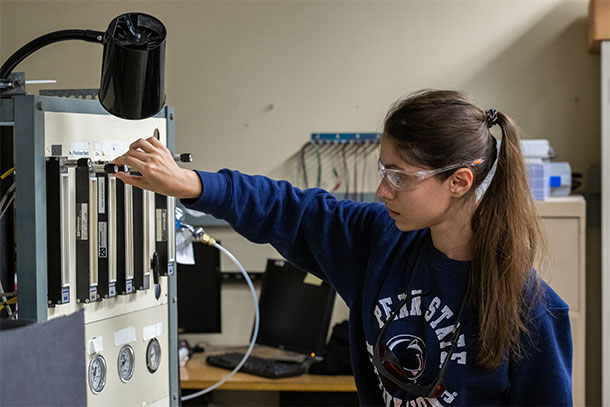
Mechanical engineering student Parvaneh Motiei runs a renewable fuels experiment in the Reacting Flow Dynamics Laboratory located in the Research East Building at Penn State. Credit: Penn State/Kelby Hochreither. All Rights Reserved.
Students invited to apply to new propulsion and power summer research program
December 2, 2022
By Mary Fetzer
UNIVERSITY PARK, Pa. — Beginning summer 2023, undergraduate students from across the country can conduct next-generation propulsion and power research and work closely with leading academic experts through a new research experience for undergraduate (REU) program in the Penn State College of Engineering. Applications are open now through Feb. 18.
The REU, called “Lowering the Carbon Footprint through Research in Propulsion and Power Generation,” will be held May 30 to Aug. 4 at Penn State. Jacqueline O’Connor, director of the Center for Gas Turbine Research, Education, and Outreach and associate professor mechanical engineering, and Karen Thole, distinguished professor of mechanical engineering, are leading the REU, which is funded by the National Science Foundation, the Air Force Office for Scientific Research, and NASA.
More than 15 undergraduate researchers will receive stipends and faculty mentorship in a diverse range of disciplines, including gas turbines, additive manufacturing, turbomachinery, low-carbon energy systems, power generation, aircraft propulsion, heat transfer, and combustion. A range of research-related activities will provide students with a broader view of research beyond their individual projects, according to O’Connor and Thole.
“We’re looking forward to providing our cohort of students with a unique summer experience,” O’Connor said. “During this 10-week program, they’ll not only be exposed to high-quality research but will also have the opportunity to network with members of industry to gain critical career skills.”
The program also will include students funded under Thole’s NASA University Leadership Initiative program; undergraduates funded by the Penn State Center for Gas Turbine Research, Education, and Outreach; and students visiting from the U.S. Air Force Academy through a partnership between the academy and Penn State.
“To solve today’s sustainable power generation and propulsion challenges to reduce climate impacts, we need to advance research with talented engineers who understand this complex field,” Thole said. “Penn State’s expertise and facilities offer students unique educational experiences in this field, and we are thankful to NASA and NSF for their support of this cadre of students.”
Applicants should be undergraduate students working toward a bachelor’s degree in engineering, materials science, computer science or a related STEM field. Applicants must have completed their sophomore year by the start of summer 2023 and have a minimum GPA of 3.0. Proof of U.S. citizenship is required for participation in this program.



